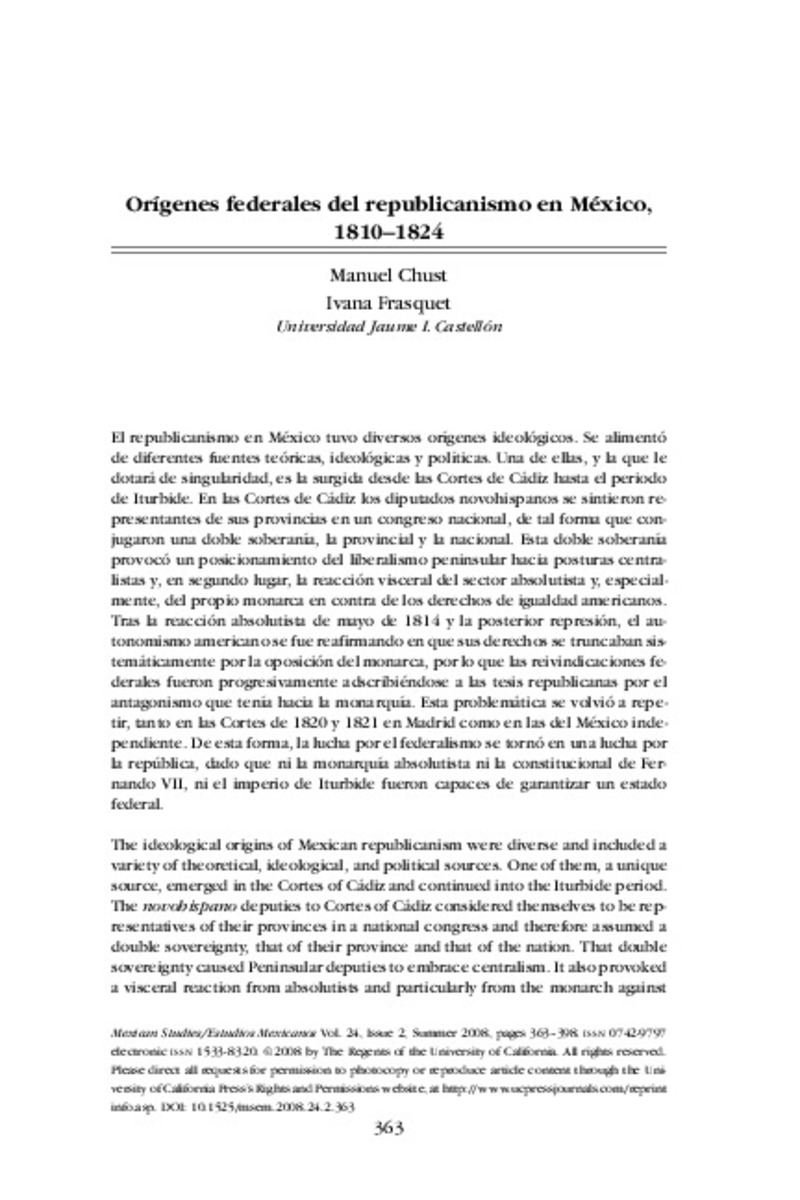Mostrar el registro sencillo del ítem
Orígenes federales del republicanismo en México, 1810–1824
| dc.contributor.author | Chust Calero, Manuel | |
| dc.contributor.author | Frasquet, Ivana | |
| dc.date.accessioned | 2017-03-15T11:05:49Z | |
| dc.date.available | 2017-03-15T11:05:49Z | |
| dc.date.issued | 2008 | |
| dc.identifier.uri | http://hdl.handle.net/10234/166734 | |
| dc.description | El republicanismo en México tuvo diversos orígenes ideológicos. Se alimentó de diferentes fuentes teóricas, ideológicas y políticas. Una de ellas, y la que le dotará de singularidad, es la surgida desde las Cortes de Cádiz hasta el periodo de Iturbide. En las Cortes de Cádiz los diputados novohispanos se sintieron representantes de sus provincias en un congreso nacional, de tal forma que conjugaron una doble soberanía, la provincial y la nacional. Esta doble soberanía provocó un posicionamiento del liberalismo peninsular hacia posturas centralistas y, en segundo lugar, la reacción visceral del sector absolutista y, especialmente, del propio monarca en contra de los derechos de igualdad americanos. Tras la reacción absolutista de mayo de 1814 y la posterior represión, el autonomismo americano se fue reafirmando en que sus derechos se truncaban sistemáticamente por la oposición del monarca, por lo que las reivindicaciones federales fueron progresivamente adscribiéndose a las tesis republicanas por el antagonismo que tenía hacia la monarquía. Esta problemática se volvió a repetir, tanto en las Cortes de 1820 y 1821 en Madrid como en las del México independiente. De esta forma, la lucha por el federalismo se tornó en una lucha por la república, dado que ni la monarquía absolutista ni la constitucional de Fernando VII, ni el imperio de Iturbide fueron capaces de garantizar un estado federal. The ideological origins of Mexican republicanism were diverse and included a variety of theoretical, ideological, and political sources. One of them, a unique source, emerged in the Cortes of Cádiz and continued into the Iturbide period. The novohispano deputies to Cortes of Cádiz considered themselves to be representatives of their provinces in a national congress and therefore assumed a double sovereignty, that of their province and that of the nation. That double sovereignty caused Peninsular deputies to embrace centralism. It also provoked a visceral reaction from absolutists and particularly from the monarch against the American quest for equality. The absolutist reaction of May 1814 and the subsequent repression convinced American autonomists that their rights would be systematically reduced by the monarch’s opposition. As a result, the federalist tendencies of the Americans increasingly changed to republicanism as the only way to achieve their goal. This trend continued both in the Cortes of 1820 and 1821 inMadrid and subsequently in independentMexico. Therefore the drive for federalism became a struggle for a republic since neither the absolutist and the later constitutional monarchy of Fernando VII nor Iturbide’s empire were willing to accept a federal state. | ca_CA |
| dc.format.extent | 37 p. | ca_CA |
| dc.format.mimetype | application/pdf | ca_CA |
| dc.language.iso | spa | ca_CA |
| dc.publisher | Mexican Studies | ca_CA |
| dc.relation.isPartOfSeries | 24; | |
| dc.rights.uri | http://rightsstatements.org/vocab/CNE/1.0/ | * |
| dc.subject | Liberalismo | ca_CA |
| dc.subject | Doceañismo | ca_CA |
| dc.subject | Provincialismo | ca_CA |
| dc.subject | Soberanía nacional | ca_CA |
| dc.subject | Federalismo | ca_CA |
| dc.subject | Republicanismo | ca_CA |
| dc.subject | España | ca_CA |
| dc.subject | México | ca_CA |
| dc.subject | Siglo XIX | ca_CA |
| dc.subject | Liberalism | ca_CA |
| dc.subject | Cádiz Constitutionalism | ca_CA |
| dc.subject | Provincialism | ca_CA |
| dc.subject | National Sovereignty | ca_CA |
| dc.subject | Federalism | ca_CA |
| dc.subject | Republicanism | ca_CA |
| dc.subject | Spain | ca_CA |
| dc.subject | Mexico | ca_CA |
| dc.subject | Nineteenth Century | ca_CA |
| dc.title | Orígenes federales del republicanismo en México, 1810–1824 | ca_CA |
| dc.type | info:eu-repo/semantics/article | ca_CA |
| dc.rights.accessRights | info:eu-repo/semantics/openAccess | ca_CA |
| dc.type.version | info:eu-repo/semantics/publishedVersion |
Ficheros en el ítem
Este ítem aparece en la(s) siguiente(s) colección(ones)
-
HIS_Articles [432]
Articles de publicacions periòdiques







